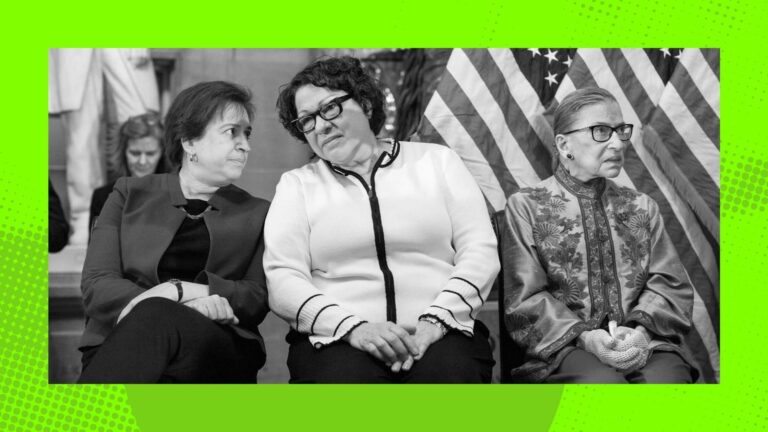How to embrace your intersectional identities
Listen of This

Spark Your Joy Podcast is hosted by Samorn Selim, a lawyer turned career coach.
Did you grow up with multiple identities? And you wondered where you fit in and belonged?
In this episode with Jaya Saxena, we discuss:
- The importance of embracing our multiple identities and how they intersect.
- How the intersectionality of our identities impact our life and career decisions and how we show up every day, and what it means to be a Zennial.
Listen to the podcast here
We might not have a progressive SCOTUS until 2065
Less of This

Yvette Borja is a writer and immigration attorney with the ACLU of Arizona and the Florence Project.
Much of the debate around Supreme Court expansion consists of handwringing speculation about the theoretical chain of events that might unfold if Congress were to add seats to the bench. Critics often contend that expanding the Court would kick off an era of never-ending growth; every time power changes hands in Washington, the argument goes, a new retaliatory expansion bill would pass, and the sheer number of justices would quickly render the Court unwieldy and useless.
Now, thanks to professors Adam Chilton, Dan Epps, Kyle Rozema, and Maya Sen, we have some data-driven predictions about the practical effects of Court expansion. In a new study, they use simulations to model how tit-for-tat Court-packing might affect control of the Court over the next 100 years. Under the status quo, the authors estimate that the Court won’t have a majority of Democratic appointees again until 2065. For context, we are closer in time right now to the release of Michael Jackson’s Thriller.
Read the story on Balls & Strikes
Justice Thomas should be charged with federal crimes
Speaking Of...

Julie A. Werner-Simon is a former federal prosecutor, and adjunct law professor at University of Southern California’s Gould School of Law & Drexel University’s Kline School of Law.
Not a day goes by, of late, without a new revelation from Pro Publica about Justice Clarence Thomas’ receipt of gifts from a particular Republican mega-donor. But what appears to be lost in the public discourse is that there is a difference between (i) the federal codes-of-conduct (such as no gifts from a single source in excess of $20 or $50 in a single year to Department of Justice employees) and (ii) what we old-timers at DOJ called “the Watergate forms.” The latter are those annual, post-Watergate, financial disclosure forms that supervisory, high-level and/or Senate confirmed federal employees from the three branches (congressional, executive and judiciary) must complete ever year.
The Supremes do not yet have a code of conduct like the lower federal courts, so nothing prevents the top jurists and their families from taking whatever they choose. But the nine federal jurists occupying One First Street NE in D.C. (like the rest of the supervisors on the federal payroll who maintain positions of public trust) must truthfully and completely fill out the annual disclosure forms. The purpose of the legislation (which sets out the mandatory duty for the federal higher-ups who receive paychecks paid by the U.S. Treasury) is crystal clear from its title. It’s called “the Ethics in Government Act of 1978.”
Read the story on Medium
Prosecutor doesn’t want to execute a (likely) innocent man, but the court won’t let him
Less of This Too

Richard Glossip is almost certainly an innocent man. In the years since police first accused him of murder in 1997, the entire case against Glossip has completely fallen apart. His first trial was tainted by so much prosecutorial misconduct and so many procedural errors that the state judiciary threw out his conviction. His second trial was equally marred by false testimony and mishandled evidence. Republican state legislators have demanded clemency for Glossip, convinced he is innocent. His execution has been scheduled and called off seven times. Earlier this month, Oklahoma’s Republican attorney general, Gentner Drummond, even took the extraordinary step of asking the Oklahoma Court of Criminal Appeals to vacate his conviction and death sentence, admitting that his second trial was “unfair and unreliable.”
On Thursday, the court refused. In a unanimous opinion, the court waved away overwhelming evidence of innocence and decided that, actually, Glossip is guilty—and must be put to death on May 18. The decision makes a sadistic mockery of the judiciary’s supposed role as a guardian of individual liberties. It favors vengeance over justice. Sadly, it aligns with the current U.S. Supreme Court’s merciless enthusiasm for the swift execution of people who are probably innocent.
Read the story on Slate









